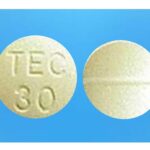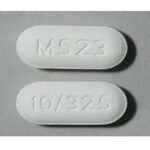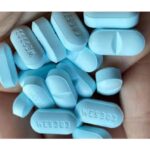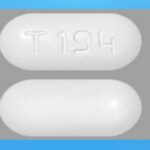T257 Pill: Uses, Dosage, Side Effects, Addiction
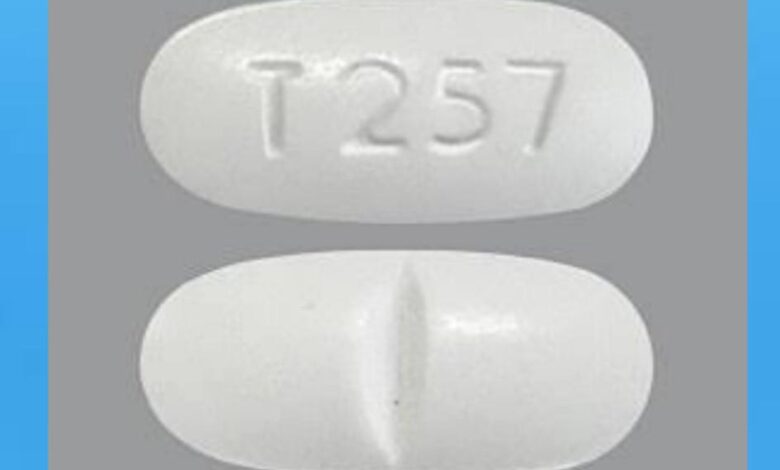
The white Capsule-shaped pill with imprint T 257 has been identified as Acetaminophen and Hydrocodone Bitartrate 325 mg / 5 mg supplied by Camber Pharmaceuticals, Inc.. Hydrocodone is a narcotic pain-reliever and a cough suppressant, similar to codeine. Hydrocodone blocks the receptors on nerve cells in the brain that give rise to the sensation of pain.
Acetaminophen is a non-narcotic analgesic (pain reliever) and antipyretic (fever reducer). Acetaminophen works by elevating the threshold to pain, that is, in order for pain to be felt, greater stimulation of the nerves responsible for the sensation of pain is necessary. It reduces fever through its action on the temperature-regulating center of the brain. Frequently, hydrocodone and acetaminophen are combined to achieve pain relief.
T 257 pill is a prescription only medication that belongs to the drug class narcotic analgesic combinations. It is classified as a Schedule 2 controlled substance under the Controlled Substance Act (CSA.)
What should I discuss with my healthcare provider before taking T257 pill?
You should not use this medicine if you are allergic to acetaminophen or hydrocodone, or if you have:
• severe asthma or breathing problems; or
• a blockage in your stomach or intestines.
Tell your doctor if you have ever had:
• breathing problems, sleep apnea;
• liver disease;
• a drug or alcohol addiction;
• kidney disease;
• a head injury or seizures;
• urination problems; or
• problems with your thyroid, pancreas, or gallbladder.
If you use opioid medicine while you are pregnant, your baby could become dependent on the drug. This can cause life-threatening withdrawal symptoms in the baby after it is born. Babies born dependent on opioids may need medical treatment for several weeks.
Do not breastfeed. This medicine can pass into breast milk and cause drowsiness, breathing problems, or death in a nursing baby.
How should I take T257 pill?
Follow all directions on your prescription label. Never take this medicine in larger amounts, or for longer than prescribed. An overdose can damage your liver or cause death. Tell your doctor if you feel an increased urge to use more of this medicine.
Never share this medicine with another person, especially someone with a history of drug abuse or addiction. MISUSE CAN CAUSE ADDICTION, OVERDOSE, OR DEATH. Keep the medicine in a place where others cannot get to it. Selling or giving away T257 pill is against the law.
Measure liquid medicine carefully. Use the dosing syringe provided, or use a medicine dose-measuring device (not a kitchen spoon).
If you need surgery or medical tests, tell the doctor ahead of time that you are using this medicine.
You should not stop using this medicine suddenly. Follow your doctor’s instructions about tapering your dose.
Store at room temperature away from moisture and heat. Keep track of your medicine. You should be aware if anyone is using it improperly or without a prescription.
Do not keep leftover opioid medication. Just one dose can cause death in someone using this medicine accidentally or improperly. Ask your pharmacist where to locate a drug take-back disposal program. If there is no take-back program, flush the unused medicine down the toilet.
What happens if I miss a dose?
Since this medicine is used for pain, you are not likely to miss a dose. Skip any missed dose if it is almost time for your next dose. Do not use two doses at one time.
What happens if I overdose?
Seek emergency medical attention or call the Poison Help line at 1-800-222-1222. An overdose of T257 pill can be fatal.
The first signs of an acetaminophen overdose include loss of appetite, nausea, vomiting, stomach pain, sweating, and confusion or weakness. Later symptoms may include pain in your upper stomach, dark urine, and yellowing of your skin or the whites of your eyes.
Overdose can also cause severe muscle weakness, pinpoint pupils, very slow breathing, extreme drowsiness, or coma.
What should I avoid while taking T257 pill?
Avoid driving or operating machinery until you know how this medicine will affect you. Dizziness or drowsiness can cause falls, accidents, or severe injuries.
Do not drink alcohol, dangerous side effects or death could occur.
Ask a doctor or pharmacist before using any other medicine that may contain acetaminophen (sometimes abbreviated as APAP). Taking certain medications together can lead to a fatal overdose.
What are the possible side effects of T257 pill?
Get emergency medical help if you have signs of an allergic reaction: hives; difficulty breathing; swelling of your face, lips, tongue, or throat.
Opioid medicine can slow or stop your breathing, and death may occur. A person caring for you should seek emergency medical attention if you have slow breathing with long pauses, blue colored lips, or if you are hard to wake up.
In rare cases, acetaminophen may cause a severe skin reaction that can be fatal. This could occur even if you have taken acetaminophen in the past and had no reaction. Stop taking this medicine and call your doctor right away if you have skin redness or a rash that spreads and causes blistering and peeling.
Call your doctor at once if you have:
• noisy breathing, sighing, shallow breathing, breathing that stops during sleep;
• a light-headed feeling, like you might pass out;
• liver problems –nausea, upper stomach pain, tiredness, loss of appetite, dark urine, clay-colored stools, jaundice (yellowing of the skin or eyes); or
• low cortisol levels — nausea, vomiting, loss of appetite, dizziness, worsening tiredness or weakness.
Seek medical attention right away if you have symptoms of serotonin syndrome, such as: agitation, hallucinations, fever, sweating, shivering, fast heart rate, muscle stiffness, twitching, loss of coordination, nausea, vomiting, or diarrhea.
Serious side effects may be more likely in older adults and those who are overweight, malnourished, or debilitated.
Long-term use of opioid medication may affect fertility (ability to have children) in men or women. It is not known whether opioid effects on fertility are permanent.
Common side effects include:
• dizziness, drowsiness, feeling tired;
• nausea, vomiting, stomach pain;
• constipation; or
• headache.
This is not a complete list of side effects and others may occur. Call your doctor for medical advice about side effects. You may report side effects to FDA at 1-800-FDA-1088.
What other drugs will affect T257 pill?
You may have breathing problems or withdrawal symptoms if you start or stop taking certain other medicines. Tell your doctor if you also use an antibiotic, antifungal medication, heart or blood pressure medication, seizure medication, or medicine to treat HIV or hepatitis C.
Opioid medication can interact with many other drugs and cause dangerous side effects or death. Be sure your doctor knows if you also use:
• cold or allergy medicines, bronchodilator asthma/COPD medication, or a diuretic (“water pill”);
• medicines for motion sickness, irritable bowel syndrome, or overactive bladder;
• other narcotic medications –opioid pain medicine or prescription cough medicine;
• a sedative like Valium –diazepam, alprazolam, lorazepam, Xanax, Klonopin, Versed, and others;
• drugs that make you sleepy or slow your breathing –a sleeping pill, muscle relaxer, medicine to treat mood disorders or mental illness;
• drugs that affect serotonin levels in your body –a stimulant, or medicine for depression, Parkinson’s disease, migraine headaches, serious infections, or nausea and vomiting.
This list is not complete. Other drugs may affect T257 pill, including prescription and over-the-counter medicines, vitamins, and herbal products. Not all possible interactions are listed here.
Where can I get more information?
Your doctor or pharmacist can provide more information about T257 pill.

